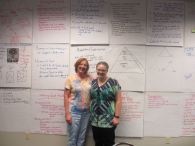Blessed to be attending the Community Health Evangelism (CHE) Training of Trainers with Steph Schulte in Springfield, MO. Today we talked about the Great Commission & Great Commandment, Triaged the patients you see in the picture (into CHE outreach, clinic, or hospital), and defined CHE. Thank you Lord for the awesome learning opportunity this is! Thanks also to Lutherans in Medical Missions for making this possible by providing the financial support! We are having a blast!
Summary of CHE Training the Trainers 1
The training that Sarah and I were able to receive thanks to the generous support of Lutherans In Medical Missions was so hands on, practical and helpful. Both Sarah and I are tasked with very large and somewhat undefined positions with the Office of International Missions: To provide health and hygiene education as well as help set up health clinics in 5 East African countries (Sarah) and 6 West African nations (Steph). As overwhelming as that sounds, the CHE training is perfectly suited to making such a huge task possible.
From day one of the conference we were very low tech. This was to help us see how these principles can be implemented anywhere in the world, computers and wi-fi not required. Before each topic a “scribe” was “voluntold”, as Sarah put it, to write the ideas that the group came up with on a big sheet of paper.
The first thing we did was to discuss our expectations for the conference. We had some pretty lofty goals: Health promotion, poverty alleviation and discipling followers of Jesus. We learned that all training is participatory and the key to CHE work is to involve motivated people from the community. Train them to do the actual hands on work and by that we multiply ourselves.
Next we got some more practical ideas and training on how to actually carry this out. We learned the importance of community involvement from the very start. Sometimes foreigners can come in with ideas of what they think needs to be done to solve a problem. Frequently, however, the local people know what needs to be done. They just lack the knowledge and understanding of how they can work together to solve the problem. Self-assessment and evaluations are completed to encourage them in their ability to work together to solve problems.
The entire CHE philosophy is built around the outsider who has some expertise and knowledge to share with the community about what it needs. Rather than trying to help everyone, which would lead to exhaustion and be extremely inefficient, this “expert” helps to form a committee of trainers. These trainers will be extensively trained by the outsider in his or her area of expertise. From there the trainers will train local, motivated and willing Community Health Educators (CHEs). The CHEs are the backbone of this type of program. They are the people physically going into the homes of their family, friends and neighbors. They are the ones actually passing along the knowledge and education that they receive from the trainers, who in turn have received their knowledge from the “expert”.
This type of programming is, to use a current buzzword, organic and incredibly effective. Often when a stranger comes in and proclaims a solution to a problem, the local people will listen politely and even make an effort towards a beginning but, in the end, wind up feeling powerless and helpless. They see the outsider as having the ability to carry out this project, but feel completely unable to do it themselves. CHE training is completely designed with the local community in mind. First, it is helped to come up with the “problems” that face it. Then, with some guidance and input from the trainers, they are led to come up with the solution and how to put that solution into practice. This is such a great, effective technique.
After this we talked about some practical ways that CHEs can be trained. We learned the LePSAS technique for teaching: LePSAS Learning Technique
- We learn best by watching and actually doing things ourselves.
- Learner Centered
- Problem Posing
- Self-discovery
- Action Oriented
- Spirit led
All this is designed to increase the effectiveness and eventual use of the knowledge being passed along. In the medical field, we know very well that people learn best by doing. This program puts that knowledge into full action.
The rest of the training was hands-on “solving” of problems. We frequently broke up into groups where we were given a big problem and had to come up with step-by-step solutions to that problem. When we looked at things from a practical, what can the community themselves do, point of view we came up with a lot of great ideas. At least we thought they were great. 🙂
The practical, hands-on nature of this training has helped both Sarah and I to take our huge, vague job descriptions and help us to begin to put some concrete, down-to-earth plans into place.
We are both looking forward to deploying to our respective areas and continuing our CHE education with a Training the Trainers 2 seminar. While at the conference we discovered that there are CHE program both in Kenya where Sarah will be living and in Togo where I will be. Isn’t it amazing how God arranges these things?
Thanks be to Him who ordains all things for his purpose and for our good.
Thanks again to Lutherans in Medical Missions for supporting our work in Africa.


